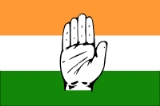
Indian National Congress
Overview
Major party
A major party is a political party that holds substantial influence in a country's politics, standing in contrast to a minor party. It should not be confused with majority party.According to the Merriam-Webster Dictionary:...
political parties in India, the other being the Bharatiya Janata Party
Bharatiya Janata Party
The Bharatiya Janata Party ,; translation: Indian People's Party) is one of the two major political parties in India, the other being the Indian National Congress. Established in 1980, it is India's second largest political party in terms of representation in the parliament...
. It is the largest and one of the oldest democratic
Democracy
Democracy is generally defined as a form of government in which all adult citizens have an equal say in the decisions that affect their lives. Ideally, this includes equal participation in the proposal, development and passage of legislation into law...
political parties in the world. The party's modern liberal
Social liberalism
Social liberalism is the belief that liberalism should include social justice. It differs from classical liberalism in that it believes the legitimate role of the state includes addressing economic and social issues such as unemployment, health care, and education while simultaneously expanding...
platform is largely considered center-left in the Indian political spectrum
Politics of India
The politics of India takes place within the framework of a federal constitutional republic, in which the President of India is head of state and the Prime Minister of India is the head of government. Executive power is exercised by the President and is independent of the legislature...
. Founded in 1885 by members of the occult
Occult
The word occult comes from the Latin word occultus , referring to "knowledge of the hidden". In the medical sense it is used to refer to a structure or process that is hidden, e.g...
ist movement Theosophical Society
Theosophical Society
The Theosophical Society is an organization formed in 1875 to advance the spiritual principles and search for Truth known as Theosophy. The original organization, after splits and realignments has several successors...
—Allan Octavian Hume
Allan Octavian Hume
Allan Octavian Hume was a civil servant, political reformer and amateur ornithologist in British India. He was one of the founders of the Indian National Congress, a political party that was later to lead the Indian independence movement...
, Dadabhai Naoroji
Dadabhai Naoroji
Dadabhai Naoroji , known as the Grand Old Man of India, was a Parsi intellectual, educator, cotton trader, and an early Indian political leader. His book Poverty and Un-British Rule in India brought attention to the draining of India's wealth into Britain...
, Dinshaw Wacha
Dinshaw Edulji Wacha
Sir Dinshaw Edulji Wacha was a Parsi Indian politician from Bombay. He was one of the founders of the Indian National Congress, and its President in 1901.He was President of the Indian Merchants' Chamber in 1915. He was knighted in 1917.-Works:...
, Womesh Chandra Bonnerjee
Womesh Chandra Bonnerjee
Womesh Chandra Banerjee was an Indian politician and the first president of Indian National Congress.- Early days :...
, Surendranath Banerjee, Monomohun Ghose
Monomohun Ghose
Monomohun Ghose was the first practicing barrister of Indian origin. He is notable for his contributions towards the fields of women’s education, for arousing the patriotic feeling of his countrymen and for being one of the earliest persons in the country in organised national politics...
, Mahadev Govind Ranade
Mahadev Govind Ranade
Justice Mahadev Govind Ranade was a distinguished Indian scholar, social reformer and author. He was a founding member of the Indian National Congress and owned several designations as member of the Bombay legislative council, member of the finance committee at the centre, and the judge of Bombay...
and William Wedderburn
William Wedderburn
Sir William Wedderburn, 4th Baronet, JP DL was a Scottish civil servant and politician.Born in Edinburgh, the fourth son of Sir John Wedderburn, 2nd Baronet, he was educated at Hofwyl Workshop, then Loretto School and finally at Edinburgh University.He entered the Indian Civil Service in Bombay in...
—the Indian National Congress became the leader of the Indian Independence Movement
Indian independence movement
The term Indian independence movement encompasses a wide area of political organisations, philosophies, and movements which had the common aim of ending first British East India Company rule, and then British imperial authority, in parts of South Asia...
, with over 15 million members and over 70 million participants in its struggle against British rule
British Raj
British Raj was the British rule in the Indian subcontinent between 1858 and 1947; The term can also refer to the period of dominion...
in India
India
India , officially the Republic of India , is a country in South Asia. It is the seventh-largest country by geographical area, the second-most populous country with over 1.2 billion people, and the most populous democracy in the world...
.
Unanswered Questions

